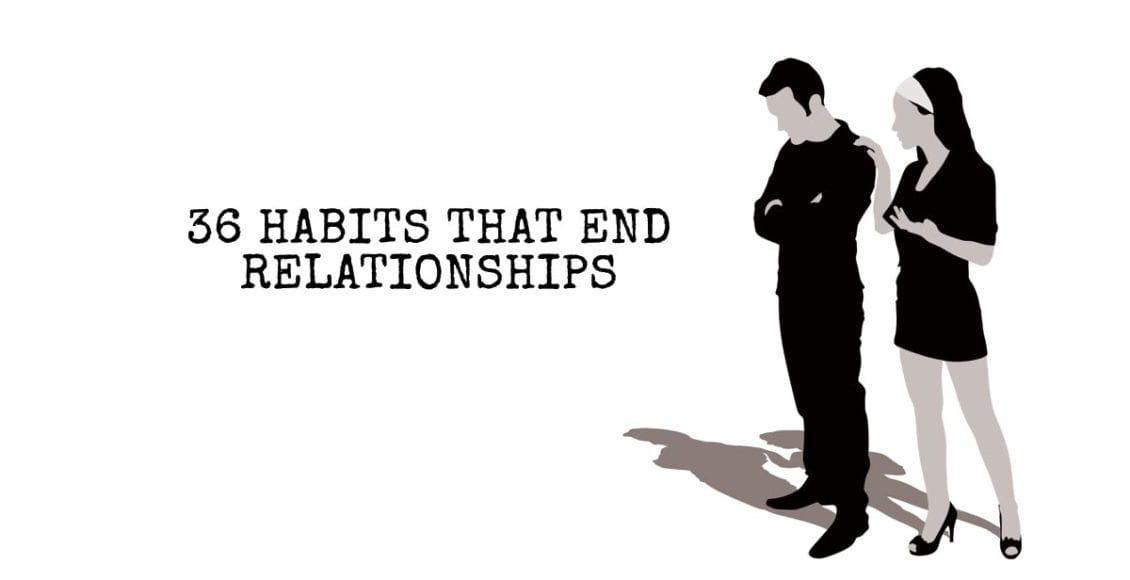“A boy made of stardust and selfishness; a girl filled with fire and fury at the world. We are a tangle of emotional wreckage, two broken messes thrown together, trying to navigate something we can barely comprehend,”
– wrote Julie Johnson in The Monday Girl.
Love is messy, because we as people are messy. Often, we become too wrapped up in our own stardust to notice our mistakes.
Do your relationships keep crashing and burning in an oddly similar fashion? Most likely, one of the habits below is to blame.
Here are 36 behaviors that ruin relationships:
1. Refusing to share difficult feelings with your partner.
2. Failing to validate your partner’s feelings.
3. Expecting your partner to fulfill you in a way only you can do for yourself.
4. Using love as an excuse for unacceptable behavior – such as jealousy, excessive control, co-dependency, or even abuse.
5. Making important decisions, purchases, or time commitments without first discussing them with your partner.
6. Refusing to take a class/join a team/pursue a project you once would have loved, because your partner is not interested in joining you.
7. Neglecting hobbies that were once important to you and made you feel whole – and/or expecting your partner to do the same.
8. Neglecting your valued friendships in favor of spending more time with your partner – and/or expecting them to do the same.
9. Overindulging in food, alcohol, drugs, shopping, pornography – anything that takes your focus away from real life.
10. Keeping secrets that would compromise the level of trust in your relationship.
11. Repeatedly nagging your partner about a single issue.
12. Ignoring your partner when they make simple and easily attainable requests.
13. Demanding that your partner share your interests, political opinions, or spiritual views.
14. Using humor to avoid healthy conflict resolution.
15. Neglecting to take responsibility for your own part in a conflict, choosing instead to focus exclusively on your partner’s mistakes.
16. Refusing to apologize when you know you have done something wrong.
17. Engaging in demeaning behavior, such as eye-rolling, sarcasm, or mocking.
18. Paying more attention to your phone than to your partner.
19. Neglecting to engage with your partner physically – or refusing affectionate gestures such as hand-holding and cuddling.
20. Lying to your partner about where you are, who you’re with, or why.
21. Refusing to allow your partner to do certain activities, go certain places, or see certain friends due to your own insecurities.
22. Projecting the flaws of your ex-partner, parents, or self onto your partner.
23. Invading your partner’s privacy by checking their phone, snooping around their apartment, or breaking into their computer.
24. Looking the other way and refusing to address the problem when your partner does something that hurts you emotionally.
25. Behaving as though you are attached to your partner at the hip.
26. Attempting to control the amount of time your partner spends with friends or family members who are important to them.
27. Refusing to respect your partner’s need for alone time.
28. Neglecting your partner’s financial concerns, and pressuring them to spend in a way that is not consistent with their budget.
29. Failing to take accountability for your actions when they hurt your partner emotionally or spiritually.
30. Refusing to allow your partner to move on from a past mistake.
31. Refusing to take steps to correct your own recurring mistakes.
32. Expecting your partner to build their life around your plans, rather than taking both schedules into account.
33. Withholding information from your partner that would change the way they felt about you or the relationship.
34. Expecting to maintain the same level of freedom and independence you did as a single person – without considering the impact of your actions on your partner’s emotional well-being.
35. Refusing to be vulnerable with your partner.
36. Feeling entitled to the good parts of a relationship, without being willing to work through the difficult moments.
“The more you know yourself, the less judgmental you become,” explained Aniekee Tochukwu Ezekiel. Did you see yourself in this list? If so, you are not alone. Most of us are guilty of at least a few of these behaviors. Don’t beat yourself up. Instead, take advantage of your self-awareness. Work to become a better partner. More importantly, extend this understanding to your loved ones. Show them grace. Not a single one of us is perfect.



